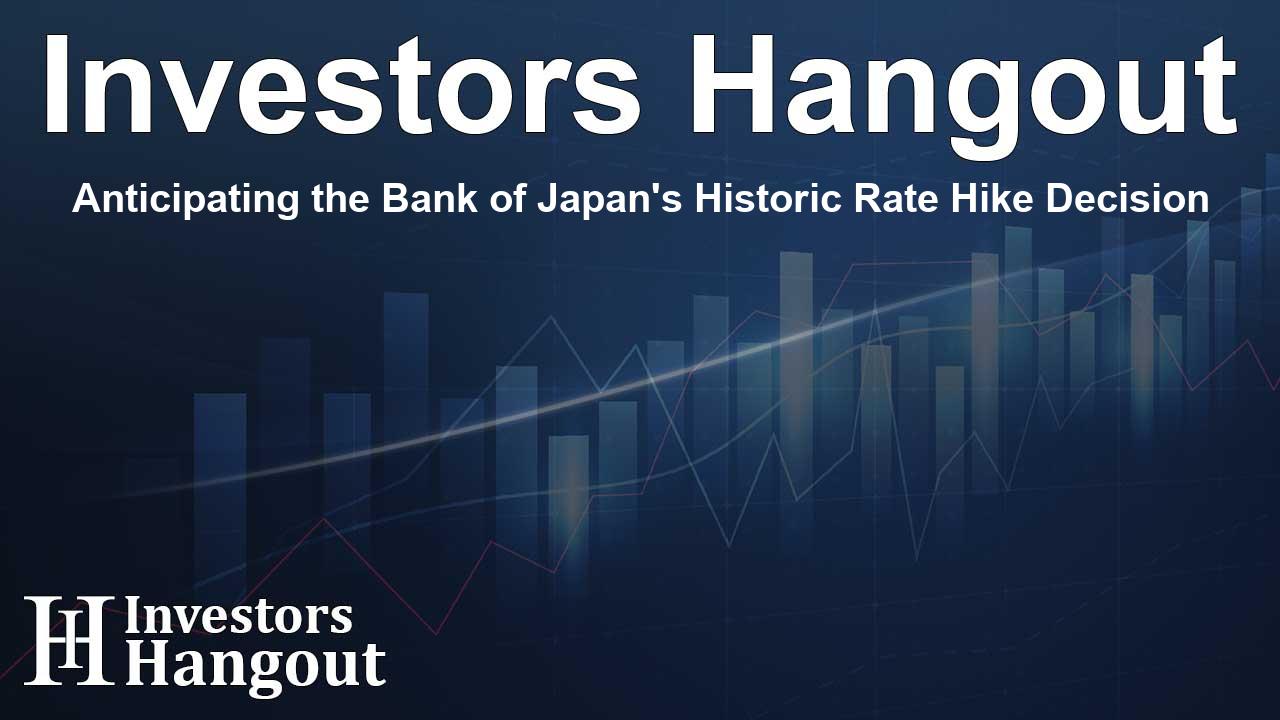Anticipating the Bank of Japan's Historic Rate Hike Decision

Introduction to the Upcoming Rate Hike
As global economic dynamics continue to shift, the Bank of Japan (BOJ) is gearing up for a pivotal moment in its monetary policy. The anticipation of an interest rate hike is on the horizon, marking a potential shift toward a new economic era for Japan.
Increasing Interest Rates: Background and Rationale
The Bank of Japan has historically maintained low interest rates to stimulate the economy, particularly after the impacts of the 2008 global financial crisis. As the economy gradually stabilizes, expectations for interest rates to rise have gained traction. Currently, short-term borrowing costs are at 0.25%, but analysts predict these could soon approach 1.0%. This proactive approach by the BOJ reflects a desire to maintain economic balance—neither cooling nor overheating the economy.
Market Reactions and Expectations
Market players are eagerly awaiting the BOJ's decisions during its upcoming two-day meeting. The consensus suggests a probable rise in the policy rate to 0.5%. However, external factors, such as potential market reactions to political developments, remain a concern. The remarks made by key figures within the BOJ have already led to the yen gaining strength, indicative of a market believing in an 80% chance of an imminent rate increase.
Potential Economic Impact
The implications of a rate hike could be significant, not only for domestic consumption but also for Japan's position in global markets. With inflation consistently exceeding the BOJ's target, the need to adapt monetary policy has become increasingly apparent. Observers are interested in how BOJ Governor Kazuo Ueda will address ongoing inflation and the BOJ's commitment to economic recovery.
The Role of Inflation and Domestic Factors
Inflation rates have been a driving force behind calls for policy adjustment. With inflation surpassing the BOJ's 2% target, the central bank's strategy may be essential to prevent the economy from overheating. Although growth forecasts have been revised positively, potential disruptions to the market—stemming from political challenges and external economic pressures—suggest caution is needed moving forward.
Political Landscape and Economic Growth
Domestic political uncertainties, including the stability of the current coalition government, could also influence economic decision-making. As Prime Minister Shigeru Ishiba's minority coalition faces challenges in passing crucial budgets, the timing of policy shifts will be crucial. Moreover, the upcoming elections add another layer of complexity to the BOJ's considerations.
Past Lessons and Future Outlook
Historical events serve as reminders of the delicate balance required in monetary policy. Previous rate hikes have led to backlash and economic instability, making the current leaders acutely aware of the ramifications of their decisions. A careful approach is required to ensure that the momentum built in recent years is not undermined by hastily implemented policies.
Conclusion: A Journey Ahead for the BOJ
As the Bank of Japan prepares for this potential rate increase, it is not just about adjusting numbers on a ledger. It’s a step toward a more resilient economic future, prompting a deeper conversation about the long-term impacts on Japan’s economy and its citizens. The conversation about rates is not just about finance but about confidence in economic prospects and the role the BOJ plays in navigating these uncharted waters.
Frequently Asked Questions
What is the expected outcome of the Bank of Japan's meeting?
Analysts predict that the BOJ may raise its short-term policy rate to 0.5% unless significant market disruptions occur.
Why is the BOJ considering a rate hike now?
With inflation consistently exceeding the target and improving economic conditions, the BOJ is looking to adjust its policies accordingly.
What are the potential risks of raising interest rates?
Increasing rates could destabilize markets and impact domestic political stability, necessitating a cautious approach.
Who is Kazuo Ueda and what is his role?
Kazuo Ueda is the current governor of the BOJ, and he plays a pivotal role in shaping the bank’s monetary policy decisions.
How might the rate hike affect everyday citizens?
Increased rates could lead to higher borrowing costs for consumers, affecting loans and mortgages, alongside potential inflation management.
About The Author
Contact Dylan Bailey privately here. Or send an email with ATTN: Dylan Bailey as the subject to contact@investorshangout.com.
About Investors Hangout
Investors Hangout is a leading online stock forum for financial discussion and learning, offering a wide range of free tools and resources. It draws in traders of all levels, who exchange market knowledge, investigate trading tactics, and keep an eye on industry developments in real time. Featuring financial articles, stock message boards, quotes, charts, company profiles, and live news updates. Through cooperative learning and a wealth of informational resources, it helps users from novices creating their first portfolios to experts honing their techniques. Join Investors Hangout today: https://investorshangout.com/
The content of this article is based on factual, publicly available information and does not represent legal, financial, or investment advice. Investors Hangout does not offer financial advice, and the author is not a licensed financial advisor. Consult a qualified advisor before making any financial or investment decisions based on this article. This article should not be considered advice to purchase, sell, or hold any securities or other investments. If any of the material provided here is inaccurate, please contact us for corrections.
